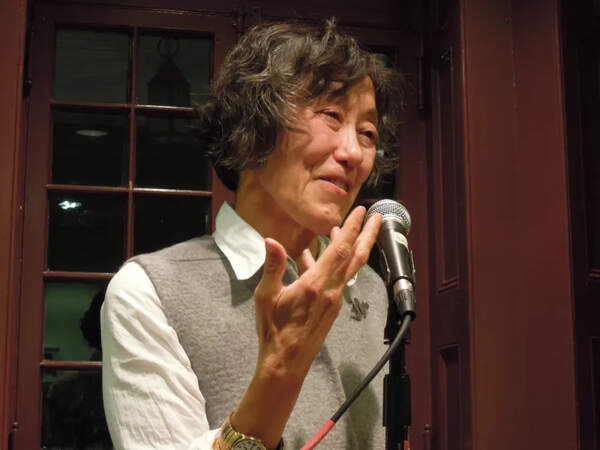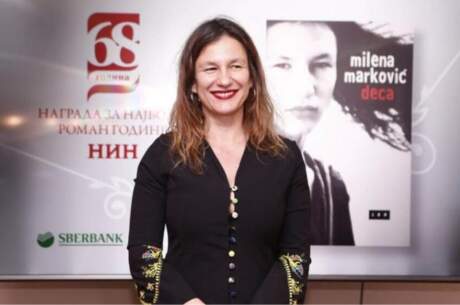Interviews
Movie Marquee Poems: An Interview with Saint Flashlight
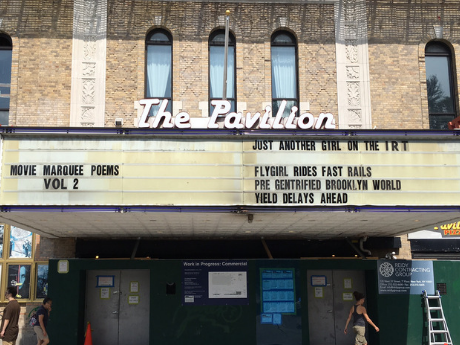
Saint Flashlight consists of childhood friends Molly Gross and Drew Pisarra, who have been working together on art installations and projects for over a decade. Movie Marquee Poems is their newest offering, a public art project in partnership with Nitehawk Cinema and the company's Prospect Park location (188 Prospect Park West, Brooklyn) Each month the previously disused marquee is repurposed to feature original haiku by contemporary poets composed in response to motion pictures.
How did the project come about?
Molly: Drew and I have been collaborating under the name Saint Flashlight since the late '00s. The name is a collaboration too: Drew came up with Saint, which reflected his interest in mystics and martyrs, and, I with my love of everyday objects and gadgets, said Flashlight. Maybe I was thinking of that wonderful Parliament song. Since becoming best pals in Junior High, we have always supported each other's creative impulses. Once I moved to New York in 2001, the conversations continued often around language, collage, and art in public spaces. Our first project was at Williamsburg's Crest Hardware shop during their annual hardware art show for which we wrote haiku about tools, using electrician's tape to install our texts. Working in another public space was a dream of ours and now it's come true!
Drew: After Crest Hardware, we pitched a public art project to the Oak Park Pharmacy in Park Slope (which didn't happen because of a timing issue) then talked about approaching the business again but never did. Then one day, we directed our gaze in the opposite direction at Bartell-Pritchard Square, and there across the circle, we saw some out-of-date signage just waiting for our input: an out-of-use movie marquee with expired movie titles including the misspelled MIDLLE SCHOOL which had become something of a neighborhood pet peeve.
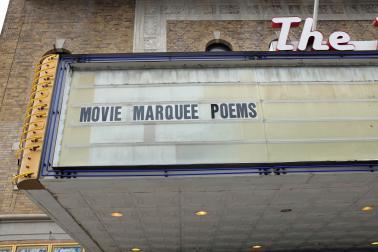
Could you tell me about the reactions you have received from the project?
Drew: The fact that the project has been covered by the "New York Post," "Curbed," and "Brooklyn Papers" has been a delightful surprise to us. Our primary goal, actually, was simply to entertain foot traffic. There's a great pleasure that comes from witnessing people's shared pleasure in pop culture verse -- whether they're counting syllables from across the street or hashtagging #moviemarqueepoems with their photos on Twitter and Instagram. A couple of stoned teens asked us if we were stealing letters off the marquee during our August installation process but even they seemed to get a kick out of the project once we'd explained exactly what we were doing.
Molly: After the first round of poems were on view in early July, including my haiku on "She's Gotta Have It," we received a message from Spike Lee's office. Getting over my nervous excitement, I called and the staff member said Lee liked the poem. That was a thrill to hear.
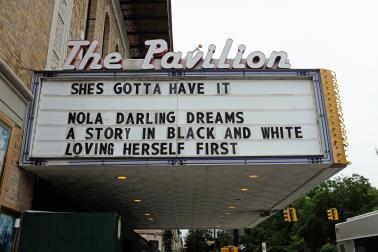
What poets do you think are most cinematic or conversely what movies or types of movies lend themselves best to haiku interpretations?
Drew: Our suggested movies for the poets had a lot more to do with titles we felt our audience would know than with films we thought were inherently cinematic. I don't think we ever could've predicted that "Moonstruck" would inspire a comic verse incorporating lactose intolerance or that "A Tree Grows in Brooklyn" would be an homage to the library where author Betty Smith hung out as a child. Which is a roundabout way of saying that you never know what's best suited to being interpreted into haiku.
Molly: I think any film could be an inspiration for haiku. As Drew mentions, for a public project like ours, a film's plot and characters need to be widely known so that there is a shorthand for connection. The challenge and the fun part for the writer is to capture the story's essence in a few words. Because I worked for BAMcinématek and saw many terrific films, I was sad that we couldn't include lesser known films such as works by the Turkish director Nuri Bilge Celyan like his epic tale "Once Upon a Time in Anatolia" (2011) or Ana Lily Amirpour's "A Girl Walks Home Alone at Night" (2014), self-described "Iranian Vampire Spaghetti Western", to name a few.
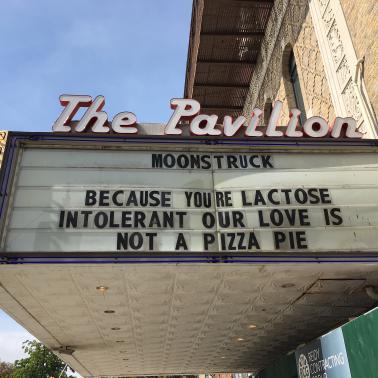
Favorite movies about poets?
Molly: I'm thinking of films that are infused with a poetic spirit, such as "Daisies" (1966) by Věra Chytilová about two rambunctious young women creating creative chaos wherever they go. Carl Theodor Dreyer's exquisite black and white films grapple with existential questions, none more than "Ordet" (1955), in which a family's spiritual beliefs are tested. The shifting sands in Hiroshi Teshigahara's "Woman of the Dunes" (1934) are a riveting character in the film. In Agnès Varda's documentary "The Gleaners and I" (2000) she ruminates on people who pick through fields after the harvest.
Drew: There's a really mind-expanding documentary on poet-activist John Trudell called Trudell that's currently streaming on Netflix. Why not start with that?

